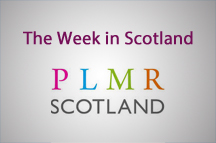 Gordon Brown to stand down as MP
Gordon Brown to stand down as MP
The news that Gordon Brown is to stand down as an MP next year did not come as a massive surprise given that earlier this year he was already referring to himself as an ‘ex-politician’. However, the response to the news was perhaps markedly different than it could have been if he had not had such a prominent role in the final weeks of the independence referendum campaign.
His 30 plus years in the House of Commons as the member for Kirkcaldy and Cowdenbeath will be remembered for different reasons depending on which side of the political divide you fall on.
 His well-documented clashes with Tony Blair, support of the Iraq war and failing to win a UK Westminster election and serving as Prime Minister for just three years would certainly not be seen as highlights. He was, however, the UK’s longest serving Chancellor in modern history and his role in preventing the recession from spiralling into a depression should not be underestimated. He was also fundamental in implementing the minimum wage, winter fuel allowance and schemes such as Child Tax Credits.
His well-documented clashes with Tony Blair, support of the Iraq war and failing to win a UK Westminster election and serving as Prime Minister for just three years would certainly not be seen as highlights. He was, however, the UK’s longest serving Chancellor in modern history and his role in preventing the recession from spiralling into a depression should not be underestimated. He was also fundamental in implementing the minimum wage, winter fuel allowance and schemes such as Child Tax Credits.
His intervention in the referendum brought a much needed jolt of electricity to the No campaign in the final weeks. His insistence that the Tories, Labour and Lib Dems work together to bring forward the Vow and more powers for Holyrood was fundamental and while his career is not over, with an increase to his role as United Nations Special Envoy on Global Education planned, his legacy is now markedly different from that of his final days at Number 10.
Autumn Statement
 The benefit to Scotland from the announcements made in the Autumn statement will mainly come in the form of increased Barnett consequentials through the existing formula. The additional £2 billion for the NHS up to 2020 will likely see around 10% of the total allocated to Scotland, with the same principal applied to the new funding for UK wide GP services. As monies through the formula are not ring fenced, it will then be a decision for the Scottish Government on whether to pass the funding on in exactly the same way as George Osbourne, whether to use it elsewhere in the Scottish National Health Service or whether to allocate it to a different area altogether.
The benefit to Scotland from the announcements made in the Autumn statement will mainly come in the form of increased Barnett consequentials through the existing formula. The additional £2 billion for the NHS up to 2020 will likely see around 10% of the total allocated to Scotland, with the same principal applied to the new funding for UK wide GP services. As monies through the formula are not ring fenced, it will then be a decision for the Scottish Government on whether to pass the funding on in exactly the same way as George Osbourne, whether to use it elsewhere in the Scottish National Health Service or whether to allocate it to a different area altogether.
The decision to review stamp duty will have no direct implications for Scotland as this tax was devolved as part of the Scotland Act 2012 and new arrangements are being rolled out from April 2015. The Land and Business Transaction Tax (LBTT) will work slightly differently to the new proposals and is viewed as more progressive than the current system as it will be less of a slab like tax and have less impact on house buyers at the lower end of the property market. LBTT in Scotland will see a ten per cent tax on properties between £250,000 and £1 million increasing to 12% for million pound plus homes and it will be lower for properties beneath £250,000. It's hoped that the change from stamp duty will help more people onto the property ladder but there is concern that the market for premium homes will stagnate as the tax payable in Scotland will jump dramatically.
The devolution of Corporation tax in Northern Ireland has angered the Scottish Government who campaigned on an agenda of a reduction in the tax as part of their referendum pledges. Opposition parties suggested it may lead to a race to the bottom and increase competition between Scotland and England for inward investment but it is likely that Nicola Sturgeon will continue to call for the tax to be devolved now that it is being taken forward from Belfast.
Drink Drive limit lowered
From today, 5th December, Scotland’s drink driving limit has been lowered. The campaign Don’t Risk It which promotes the reduction is aimed at encouraging drivers to abstain from alcohol altogether given the new lower limit, of 50mg in every 100ml of blood, means even a small glass of wine or half pint of beer could put you over the limit. To err on the side of caution, drivers are also being warned that those heavy Christmas party nights could push you over the limit the next day.
While the reduction does put Scotland in line with the majority of Europe, it means that those living near the border could be under the limit in England but over as they enter Scotland, which could prove problematic.














